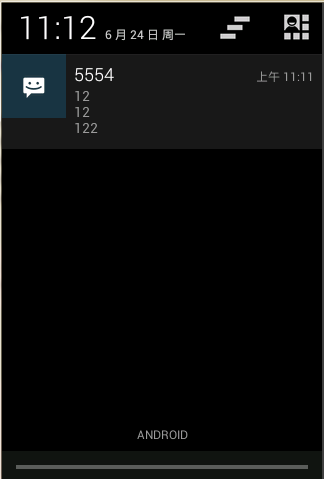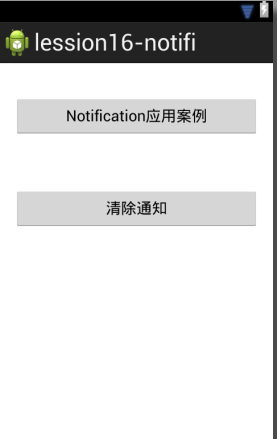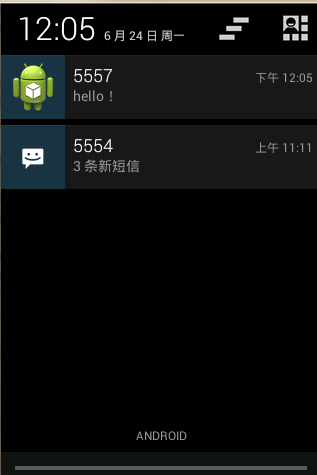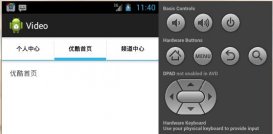本文实例讲述了android编程开发之notification用法。分享给大家供大家参考,具体如下:
notification就是通知的意思,安卓中指通知栏,一般用在电话,短信,邮件,闹钟铃声,在手机的状态栏上就会出现一个小图标,提示用户处理这个快讯,这时手从上方滑动状态栏就可以展开并处理这个快讯。
在帮助文档中,是这么说的, notification类表示一个持久的通知,将提交给用户使用notificationmanager。已添加的notification.builder,使其更容易构建通知。
notification是一种让你的应用程序在没有开启情况下或在后台运行警示用户。它是看不见的程序组件(broadcast receiver,service和不活跃的activity)警示用户有需要注意的事件发生的最好途径。
先来区分以下状态栏和状态条的区别:
1、状态条就是手机屏幕最上方的一个条形状的区域;
在状态条有好多信息量:比如usb连接图标,手机信号图标,电池电量图标,时间图标等等;

2、状态栏就是手从状态条滑下来的可以伸缩的view;
在状态栏中一般有两类(使用flag_标记):
(1)正在进行的程序; (2)是通知事件;

一个notification传送的信息有:
1、一个状态条图标;
2、在拉伸的状态栏窗口中显示带有大标题,小标题,图标的信息,并且有处理该点击事件:比如调用该程序的入口类;
3、闪光,led,或者震动;
下面对notification类中的一些常量,字段,方法简单介绍一下:
常量:
default_all 使用所有默认值,比如声音,震动,闪屏等等
default_lights 使用默认闪光提示
default_sounds 使用默认提示声音
default_vibrate 使用默认手机震动
注意:在加入手机震动效果时一定要在项目清单文件中加入手机震动权限:
下面通过简单额小实例来具体实现notification功能:
mainactivity.java:
|
1
2
3
4
5
6
7
8
9
10
11
12
13
14
15
16
17
18
19
20
21
22
23
24
25
26
27
28
29
30
31
32
33
34
35
36
37
38
39
40
41
42
43
44
45
46
47
48
49
50
|
package com.example.lession16_notifi;import android.app.activity;import android.app.notification;import android.app.notificationmanager;import android.app.pendingintent;import android.content.res.resources.notfoundexception;import android.os.bundle;import android.view.view;import android.widget.toast;public class mainactivity extends activity { private notificationmanager notificationmanager; @override protected void oncreate(bundle savedinstancestate) { super.oncreate(savedinstancestate); setcontentview(r.layout.activity_main); // 第一步:通过getsystemservice()方法得到notificationmanager对象; notificationmanager = (notificationmanager) getsystemservice(notification_service); } // 测试 public void test1(view v) { shownotification("来短信了", "5557", "hello!", r.drawable.ic_launcher, r.drawable.ic_launcher); } // 第二步:对notification的一些属性进行设置比如:内容,图标,标题,相应notification的动作进行处理等等; public void shownotification(string tickertext, string contenttitle, string contenttext, int iconid, int notiid) { // 创建一个notification notification notification = new notification(); // 设置通知 消息 图标 notification.icon = iconid; // 设置发出消息的内容 notification.tickertext = tickertext; // 设置发出通知的时间 notification.when = system.currenttimemillis(); // 设置显示通知时的默认的发声、振动、light效果 notification.defaults = notification.default_vibrate;// 振动 // notification notification = new notification(r.drawable.ic_launcher,"有新的消息", system.currenttimemillis()); // 3步:pendingintent android系统负责维护 pendingintent pendingintent = pendingintent.getactivity(this, 0,getintent(), 0); // 4步:设置更加详细的信息 notification.setlatesteventinfo(this, contenttitle, contenttext,pendingintent); // 5步:使用notificationmanager对象的notify方法 显示notification消息 需要制定 // notification的标识 notificationmanager.notify(notiid, notification); } // 6步:使用notificationmanager对象的cancelall()方法取消 public void clearnoti(view v) { notificationmanager.cancelall();// 清除所有 }} |
布局文件activity_main.xml:
|
1
2
3
4
5
6
7
8
9
10
11
12
13
14
15
16
17
18
19
20
21
22
23
24
25
26
27
28
29
|
<relativelayout xmlns:android="http://schemas.android.com/apk/res/android" xmlns:tools="http://schemas.android.com/tools" android:layout_width="match_parent" android:layout_height="match_parent" android:paddingbottom="@dimen/activity_vertical_margin" android:paddingleft="@dimen/activity_horizontal_margin" android:paddingright="@dimen/activity_horizontal_margin" android:paddingtop="@dimen/activity_vertical_margin" tools:context=".mainactivity" > <button android:id="@+id/button1" android:layout_width="wrap_content" android:layout_height="wrap_content" android:layout_alignparentleft="true" android:layout_alignparentright="true" android:layout_alignparenttop="true" android:layout_margintop="22dp" android:onclick="test1" android:text="@string/text_notifi" /> <button android:id="@+id/button2" android:layout_width="match_parent" android:layout_height="wrap_content" android:layout_alignleft="@+id/button1" android:layout_below="@+id/button1" android:layout_margintop="60dp" android:onclick="clearnoti" android:text="@string/text_clear" /></relativelayout> |
布局效果:

切记实现震动效果在清单文件中加入权限:
实现效果如下:


希望本文所述对大家android程序设计有所帮助。














